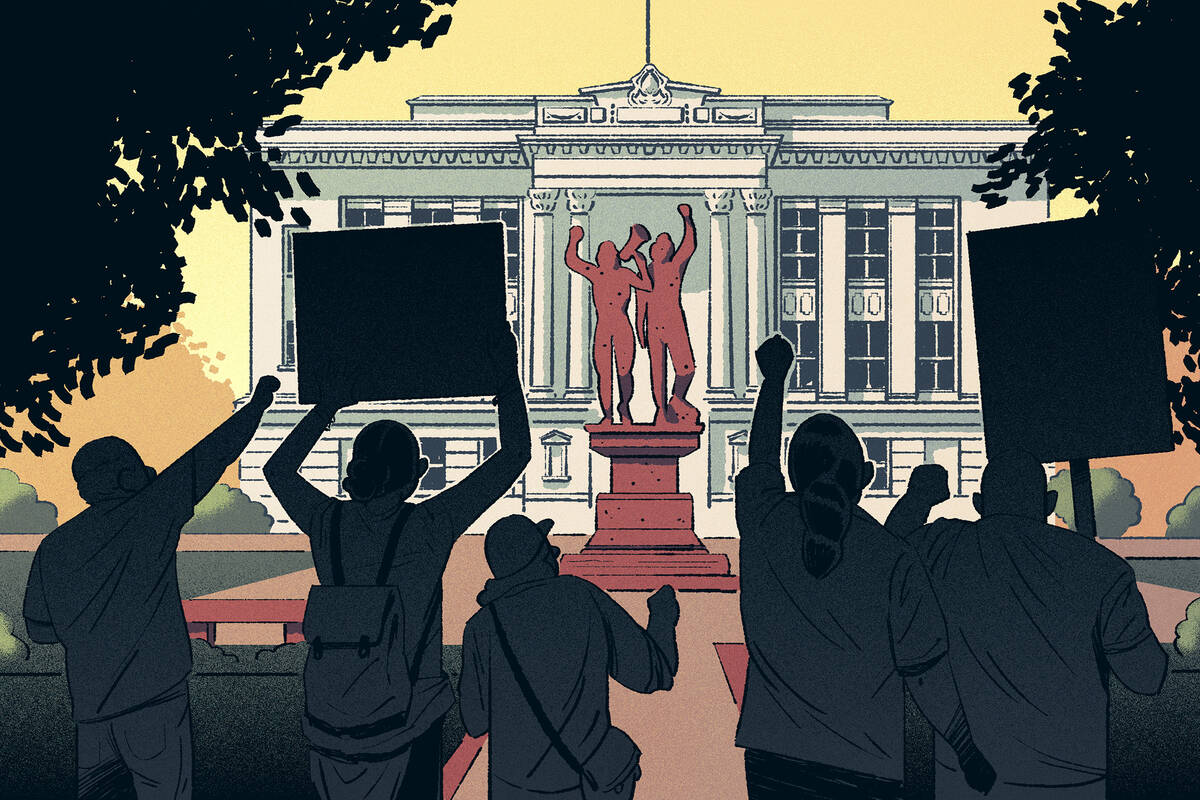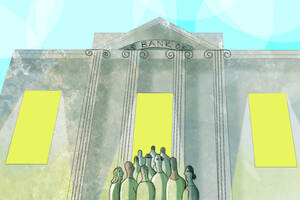Politics & Elections Social Impact Oct 1, 2022
When Do People Protest and When Do They Just Grumble? History Offers Clues.
A tradition of anti-government uprisings can impact communities centuries later.

Michael Meier
When citizens feel mistreated or let down by their government, the response can seem unpredictable. In some places, outraged residents may take to the streets to demand change on a particular issue—for instance, pollution, budget cuts, or broken promises to change laws. In other areas, people may grumble to each other about similar problems but ultimately remain passive. Why?
“There are often many communities that face the same potential grievances against the government,” says Jacopo Ponticelli, an associate professor of finance at Kellogg. “In some of these communities, this discontent then becomes action. And in others, it doesn’t.”
Ponticelli and a colleague, Meng Miao at Renmin University, wondered if a community’s history of protests made a difference. If a place was known for rising up in the past, even decades or centuries ago, would that tradition influence modern-day citizens’ decisions to take action?
The researchers tested their hypothesis in China, studying rebellions during the Qing dynasty from the 17th to early 20th century, as well as those occurring today.
They devised a clever method for establishing which parts of the country had a history of activism, relying on records of solar eclipses and their connection to protests. During the Qing dynasty, people believed that eclipses were a sign from the heavens indicating displeasure with a ruler. The team found that being in the path of an eclipse was linked to a higher likelihood of an uprising—and counties with a history of those eclipse-driven rebellions were more likely to protest in the present day. The pattern was particularly pronounced in places that honored past rebel leaders with temples and legends.
“This historical tradition of antigovernment protest can actually impact the reaction centuries later,” Ponticelli says.
Places that commemorate historical protests might be fertile ground for leaders of social-justice movements to motivate people into action. But the dark side of this persistence is that it might also extend the lifetime of less noble beliefs. For instance, if a community has an unsavory history of anti-democracy ideas, transmitting that history and celebrating past leaders “might be very dangerous,” Ponticelli says. “These traditions can last a long time.”
Blacking Out the Sun
Protests have long been associated with voting behavior and policy change. For instance, higher turnout at Tea Party protests in 2009 was linked to higher vote shares for Republican candidates in the following year’s midterm elections. And in districts with bigger protests, incumbents were more likely to take conservative positions on House bills.
But figuring out which factors make people protest isn’t straightforward. If one community demands change and another does not, the two places likely have many differences between them. One might be rural, another urban; one might have higher unemployment; one might have a bigger minority population; and so on.
If a community has an unsavory history of anti-democracy ideas, transmitting that history and celebrating past leaders “might be very dangerous.”
— Jacopo Ponticelli
Similarly, testing the idea that a place’s history affects a community’s tendency to protest was tricky. If Ponticelli and Miao had simply compared places with more versus fewer past rebellions, they couldn’t convincingly argue that the historical revolts caused a difference in modern-day protests. Other unknown factors, such as economic or social conditions, could have driven both the past and present uprisings.
The ideal method would be to conduct a rigorous experiment in which the team magically made protests happen in random communities in the past, then monitored them years later to see if those places were more likely to protest again in the present. That obviously wasn’t possible.
But eclipses could perform a similar function. They were an external phenomenon, unrelated to any economic or social factors on Earth. And they were a plausible driver of rebellions: People in China interpreted eclipses as casting doubt on an emperor’s legitimacy. If peasants were already unhappy about their living conditions, an eclipse might motivate them to rise up together.
The team could then check if the “extra” rebellions induced by eclipses were linked to more protests in the present. This methodology is “at the core of the problem,” Ponticelli says. “Otherwise, we are potentially comparing apples and oranges.”
From Past to Present
First, the researchers checked whether eclipses were correlated to any other factors that might affect the tendency to protest. They obtained historical data from NASA on eclipses from 1644 to 1912. Counties in China that were in the totality zone—where the moon completely blocked the sun—were also more likely to be farther east, closer to the coast and to the capital city of Beijing. So the team controlled for those factors in the rest of the study. (Other geographic and socioeconomic factors, such as terrain ruggedness, county population size, and agricultural tax levels, had no link to eclipses.)
Then they examined data on 1,806 peasant uprisings in China during the same period, which were documented in a book called the Chronology of Warfare in Dynastic China. Counties in the totality zone of an eclipse were 18 percent more likely to have a rebellion that year, the team found.
Ponticelli and Miao weren’t sure if the influence of these rebellions would linger centuries later. People might have simply forgotten the past. And many Chinese people had moved from rural to urban areas over the last few decades, perhaps leaving such memories behind.
To find out, the researchers turned to data on protests in China from 2001 to 2013, catalogued by the Chinese Academy of Social Sciences. They then determined whether the extra historical protests linked to eclipses seemed to cause more protests during this modern period. The answer was yes: One additional eclipse-driven rebellion increased a county’s chances of a protest during the 13-year modern period by 10 percent.
Captured Memories
Why would these past rebellions continue to exert a significant influence? The researchers wondered if the phenomenon was driven by communal memories that were preserved by temples that celebrated leaders of these movements, as well as tales of their exploits in local chronicles. A historical anecdote suggested that the rebels themselves had been inspired by past heroes: a revolution leader from the early 1900s was apparently fascinated as a child by stories of another rebel from a half-century ago.
Ponticelli and Miao searched local chronicles for information about temples, memorials, and legends of people who had fought the Qing invasion from 1644 to 1664. And indeed, they found that the effect of eclipse-driven rebellions on modern protests was particularly strong in places that celebrated those historical leaders.
Dark Legacies
It’s too soon to say whether the study’s findings in China extend to other countries, such as the United States. But Ponticelli says it’s plausible that memorials elsewhere also help transmit memories and drive the tendency to protest.
In addition to encouraging people to rise up against injustice, though, these memorials could prolong beliefs that are now widely considered repugnant.
Consider the controversy over whether to remove Confederate statues in the American South. While many communities insist that these are simply ways to remember a particular moment in history, this research suggests that memorializing figures associated with slavery could potentially prolong racist views.
Memorials that celebrate these past leaders may “amplify the long-run effect of the memory within a certain community,” he says. “They can be pretty powerful in transmitting ideas over time.”
Roberta Kwok is a freelance science writer in Kirkland, Washington.
Miao, Meng, and Jacopo Ponticelli. “Eclipses and the Memory of Revolutions: Evidence from China.” Working paper.



